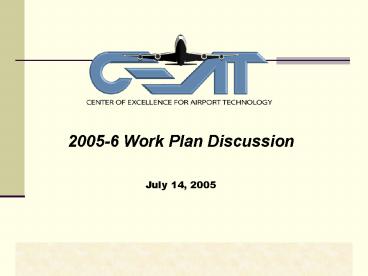2005-6 Work Plan Discussion - PowerPoint PPT Presentation
1 / 15
Title:
2005-6 Work Plan Discussion
Description:
Through real time use of this model maintenance can monitor real ... UIUC GPR Applications in Pavements Quality control for new construction Diagnostic tool ... – PowerPoint PPT presentation
Number of Views:92
Avg rating:3.0/5.0
Title: 2005-6 Work Plan Discussion
1
2005-6 Work Plan Discussion July 14, 2005
2
Opportunities in 2005/6
- Extension of Current Technical Thrusts
- Subgrade Stabilization -- Tutumluer/Thompson
- Raw Materials -- Struble
- PCC Pavement -- Roesler/Lange
- New Directions
- Pavement Icing Hazards -- Dempsey
- Asphalt overlays -- Buttlar/Al-Qadi
- Plantings, Wildlife and Safety --
Herricks/Branham
3
OMP Continuing Project for 2005-06
- Subgrade Soil Support and Stabilization
- Co-PIs Erol Tutumluer Marshall R. Thompson
- RA H.S. Brar
- Additional soil-lime testing will be conducted in
the laboratory for soil samples with different
lime percentages and lime sources - Cooperate with OMP in the development of
construction monitoring guidelines for 9L-27R
subgrade soil lime modification stabilization
4
OMP Continuing Project for 2005-06
- Subgrade Soil Support and Stabilization
- (Continued)
- Develop and recommend to OMP a program to
evaluate the completed lime stabilization
construction as related to the k-150
requirement (U of I will cooperate with OMP in
implementing the program) - Continue to work with OMP on current and future
subgrade soil support and stabilization issues
for OMP runways/taxiways
5
Proposed CEAT Materials Research for 2005-6 --
Leslie Struble
- Study impact of potassium acetate deicing
chemicals on ASR (proposal submitted) - Measure effectiveness of ASR mitigating
admixtures
6
PCC Pavements -- Roesler/Lange
- Continue toward current goals
- Concrete mix design, volume change, aggregate
size, slab load transfer - Saw cut timing
- Extend effort toward field instrumentation
- Validate material and pavement models
- Use of recycled concrete
- Internal curing
7
Pavement Icing HazardsBarry Dempsey
- Adapt the Enhanced Integrated Climatic Model
(EICM) to real time pavement temperature
monitoring for icing and other winter hazard
conditions. - Basic Issues Icing conditions are not only a
function of the air temperature but the
temperature history in the pavement leading up to
the possible icing condition. Pavement
temperatures and air temperatures can be quite
different based on the climate and pavement
temperature history.The EICM is used extensively
in the new AASHTO Design procedure and has been
found to work very well in that application.
8
Pavement Icing Hazards
- The EICM operates on hourly climatic data and
predicts pavement temperatures with a high level
of accuracy. The model has evolved over
Dempseys 30 plus years of research and is quite
sophisticated. It operates on local climatic
data input. Through real time use of this model
maintenance can monitor real time temperatures in
the pavement so as to project the probability
levels for icing or slippery surface conditions.
- Goal Better scheduling for anti icing chemical
applications and more economical control of
application rates
9
Asphalt Overlays Reflective Cracking Causes and
Prevention
William G. Buttlar, Ph.D., P.E. Imad Al-Qadi,
Ph.D., P.E. University of Illinois at
Urbana-Champaign
10
1) Reflective Cracking in Airport Overlays
2) Mechanism of Reflective Cracking
- - Do we need any modification in the current
design? - - Is there any way to reduce the maintenance cost
- or to delay reflective cracking?
- What analysis tools are needed?
Environmental and Load Related Factors
Field Performance
3) Key Factors
4) Tools
- Asphalt Overlay and interlayer properties
- Load transfer between the underlying concrete
slabs - Subgrade support
- Structural condition of the underlying slabs
- Fracture mechanisms (crack initiation and
propagation) - Bonding condition between slabs and underlying
layer
LAB Testing
Computer Modeling
11
Cutting-Edge Testing and Analysis Tools
Laboratory Tests
FE Modeling
Multi-scale Modeling
Image Processing
Material Properties
12
Related Studies Tech Transfer
- FAA Overlay Study (2002-2005)
- NSF GOALI Study (2002-2006)
- FHWA Pooled Fund Thermal Cracking Study
(2004-2006) - IDOT Reflective Cracking Study (2005-2008)
13
Analysis of Suitability of Soils at OHare to
Support Turfgrass Growth
- Dr. Bruce Branham
- Department of Natural Resources Environmental
Sciences, UIUC
14
GPR Applications in Pavements
- Quality control for new construction
- Diagnostic tool for existing structures
- Detect flaws
- Detect moisture
- Measure concrete slab and base thicknesses
- Detect rebar locations and estimate cover depth
15
Reinforcement and Layer Interface Detection Using
GPR
CRCP (ground-coupled)































